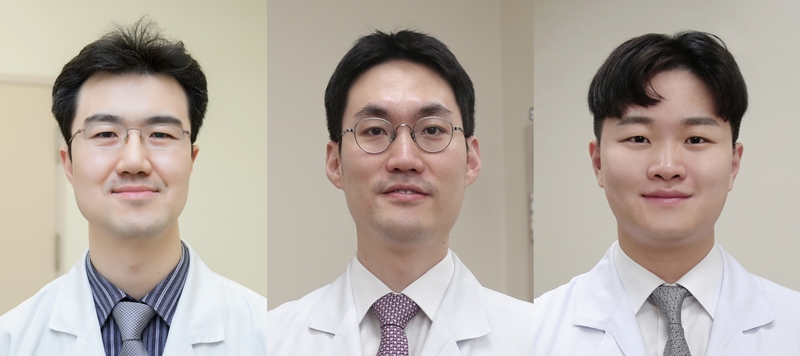-
- Global AMC MENU
- NEWS
- HEALTH
- PEOPLE
- Introduction
New Therapy to Be Evaluated for Relapsed or Refractory Diffuse Large B Cell Lymphoma Patients Who Did Not Respond to Existing CAR T Treatment
Human Derived Antibodies Reduce Immune Rejection and Shorten the Distance Between CAR T Cells and Cancer Cells to Maximize Anticancer Effects

▲ (From left) Professors Dok Hyun Yoon, Hyungwoo Cho, and Jaewon Hyung from the Division of Oncology at Asan Medical Center
Diffuse large B cell lymphoma (DLBCL), which accounts for 30 to 40 percent of all lymphoma cases, is the most common type of blood cancer in adults. While many patients can be cured with standard chemotherapy, those who do not respond to treatment or relapse after therapy are known to have a very poor prognosis.
The team of Professors Dok Hyun Yoon, Hyungwoo Cho, and Jaewon Hyung from the Division of Oncology at Asan Medical Center recently announced that their clinical study evaluating the efficacy and safety of the new anti CD19 CAR T therapy AT101 for patients with relapsed or refractory diffuse large B cell lymphoma who failed to respond to existing CAR T treatment has been selected as a national research project under the Korea Health Industry Development Institute’s program to promote clinical research in advanced regenerative medicine.
CAR T therapy is a treatment that removes immune cells (T cells) from a patient’s blood, engineers them to express chimeric antigen receptors that target specific cancer cells, and then reinfuses them into the patient to eliminate the cancer cells.
Most CAR T therapies target a protein called CD19, which is found on the surface of B cells, one type of immune cell types in the body. Since lymphoma develops when B cells turn cancerous, CD19 is expressed in most B cell lymphomas. However, because it is rarely expressed in major organs such as the liver or lungs, CD19 is considered an ideal target that allows CAR T therapies to selectively attack cancer cells.
Existing CAR T therapies that target CD19 have significantly improved survival rates for patients with B cell lymphoma. However, previous studies have shown that 6 out of 10 patients still either do not respond to treatment or experience relapse, highlighting important limitations.
Through this national research project, which will run for two years starting in September 2025, the research team plans to evaluate the efficacy and safety of the new CAR T therapy AT101 in patients who experience relapse or resistance despite receiving existing CAR T treatment.
In addition, AT101 uses human derived antibodies that bind to cancer cell surfaces at a closer position than mouse antibodies. This shortens the distance between CAR T cells and target cells, leading to stronger activity and maximizing the anticancer effect.
Professor Dok Hyun Yoon from the Division of Oncology at Asan Medical Center said, “It is very meaningful to be able to conduct research on a new therapy for patients with relapsed or refractory diffuse large B cell lymphoma who did not benefit from existing CAR T treatments. We hope that AT101 will become a new treatment strategy for patients with difficult-to-treat blood cancers.”
Asan Medical Center established its CAR T Center in 2022 and has since successfully performed more than 100 CAR T treatments. In addition to diffuse large B cell lymphoma, the center is also conducting clinical studies of CAR T therapy for various cancers, including central nervous system lymphoma, follicular lymphoma, multiple myeloma, and hepatocellular carcinoma.












